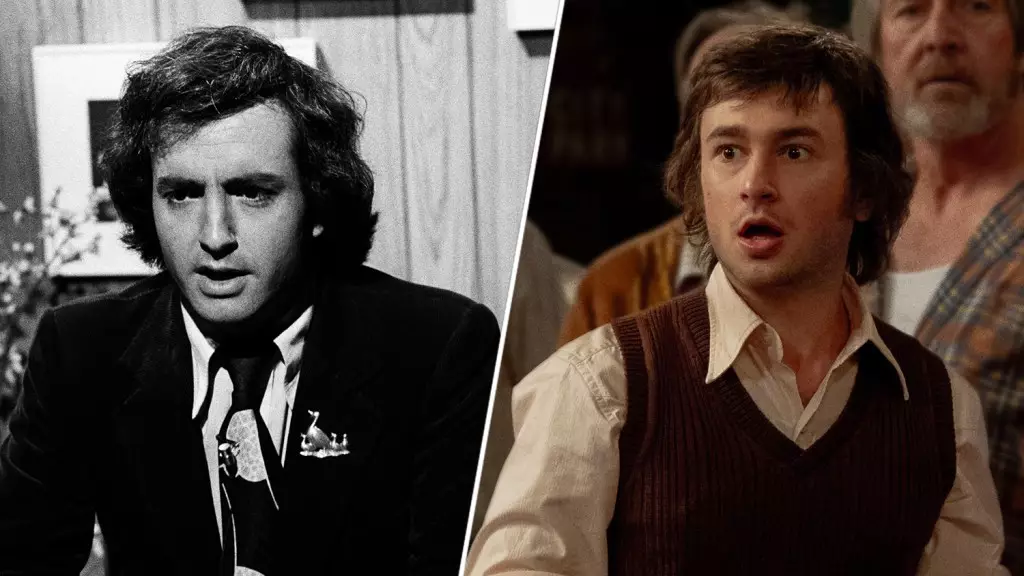Gabriel LaBelle has stepped into challenging territory with his role in the new film “Saturday Night,” where he dons the persona of Lorne Michaels, the legendary creator of “Saturday Night Live.” The film, which piques interest with its focus on the chaotic and transformative first night of SNL in 1975, offers a unique lens on the television landscape and the revolutionary comedians who shaped it. LaBelle’s experience on set was not just confined to acting; it involved an immersive exploration of the historical and cultural significance of the late-night show that continues to dominate television comedy today.
During the filming, LaBelle had the exceptional opportunity to visit the iconic 30 Rockefeller Plaza, a location synonymous with SNL, and witness a live taping of the show. This firsthand experience was significant not only for his performance but also for truly understanding the atmosphere that Lorne Michaels fostered. Upon his arrival at the studio, LaBelle recalled the excitement that came with being part of a production that has influenced generations of entertainers. “Lorne was super cool and invited us to watch the Josh Brolin episode live,” he expressed in an interview with IndieWire. This moment highlights the camaraderie and respect within the world of comedy, as established figures like Michaels take the time to include newcomers in such enriching experiences.
LaBelle’s interactions didn’t end with merely being a spectator. After the live taping, he managed to engage briefly with Michaels, the embodiment of SNL’s groundbreaking legacy. Sharing such moments, whether superficial in their profundity or loaded with meaning, can have a lasting impact on an actor’s interpretation of their role. The presence of other prominent figures during the event, such as Scarlett Johansson and director Jason Reitman, further amplified the significance of the occasion. In LaBelle’s words, he opted to let the icons converse among themselves while he absorbed the atmosphere, demonstrating a humble appreciation for the comedy community.
The film “Saturday Night” aims to peel back the curtain on the behind-the-scenes operations of the first SNL broadcast. This ambitious approach allows viewers not only to appreciate the humor but to appreciate the hard work and persistence required to achieve historic artistic milestones. As LaBelle notes, the film captures the “90 minutes leading up to the first-ever broadcast,” positioning itself as both a narrative of artistic bravery and a nod to the complexities behind comedy’s evolution on television.
The anticipation surrounding the film’s release is palpable, especially with its premiere set for October 11, just a few weeks ahead. LaBelle has expressed uncertainty over whether Lorne Michaels has seen his portrayal, indicating a sense of both eagerness and trepidation regarding reactions from the very people they portray. “Jason is in contact with Lorne. Lorne’s been very kind and congratulatory to Jason, but I don’t know if he’s seen it,” LaBelle mentioned. This sentiment echoes a universal truth in acting: the desire for validation from one’s inspirations can be as thrilling as it is nerve-wracking.
Director Jason Reitman also remarked on Michaels’ response to the film, noting his cryptic nature, which adds another layer of intrigue. Will Michaels accept the portrayal gracefully, or will his reactions remain shrouded in mystery? The question is particularly intriguing, considering the reverence with which fans and critics alike regard his contributions to comedy.
“Saturday Night” boasts a diverse and talented ensemble cast, featuring Rachel Sennott as Rosie Shuster and Dylan O’Brien as Dan Aykroyd, among others. Each actor is tasked with bringing to life the comedic icons that not only entertained but also paved the way for future generations of humorists. The synergy of such a cast suggests that the film will likely resonate with both audiences familiar with SNL’s history as well as those less versed in its legacy.
As LaBelle steps into the shoes of a man who significantly altered the comedic landscape, his performance—alongside his fellow cast members—is poised to revive interest in the origin of a cultural phenomenon. Together, they will ignite conversations not only about comedy’s past but also its future trajectory, inviting viewers to reflect on the moments that shaped their lives through laughter.
In retrospect, “Saturday Night” stands as an ambitious project that pays homage to the ingenuity and creativity required to bring nightly humor into American homes. As we await its release, LaBelle’s journey serves as a reminder of the powerful intersection between art and the individual stories of those who create it.


Leave a Reply